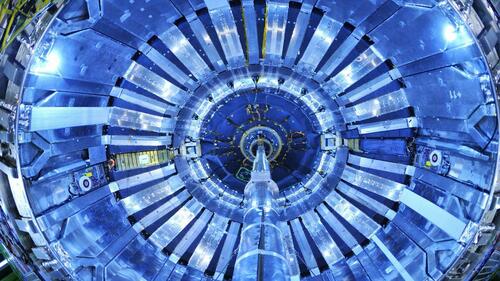CERN May Idle World’s Largest Particle Collider As Europe’s Energy Crisis Worsens
Europe’s historic energy crisis is not only disrupting energy-intensive industries and collapsing household finances, but it could soon halt or limit experiments at the European Organization for Nuclear Research (CERN).
WSJ reported CERN is planning to shutter some of its particle accelerators at peak demand hours and is considering idling the world’s biggest particle accelerator—the Large Hadron Collider (LHC).
“Our concern is really grid stability because we do all we can to prevent a blackout in our region,” said Serge Claudet, chair of the CERN energy management panel.
CERN, located near France–Switzerland border, consumes 1.3 terawatt hours of electricity annually and is one of state-controlled French power giant EDF SA’s largest clients. The amount of power it uses in a year can power 300,000 homes.
Claudet said some of its eight particle accelerators and two particle decelerators could be shut down to conserve power. If necessary, he said the facility could idle LHC.
For three years, LHC underwent maintenance work and only became operational in July, working at even higher energy levels as scientists fired proton beams at the speed of light around a 17-mile ring, slamming them together to examine what appeared in the aftermath of the collisions.
These experiments could soon be put on hold as the cold season is just a few short months away and Europe’s energy crisis worsened in the last several days.
For the first time last month, French year-ahead power prices surged to 1,000 euros per megawatt-hour. Half of the country’s nuclear reactors are offline for repairs and maintenance, further straining the grid that usually receives 67% of power generation from atomic energy.
Lowering electricity consumption at CERN is Claudet’s objective. Shutting down other accelerators besides the LHC could reduce consumption by a quarter. WSJ noted that if LHC is shut down, it will save another 25%. However, as WSJ explained, it comes at a cost: an enormous amount of energy is used “on superconducting magnets cooled to -456 degrees Fahrenheit to bend the particle beam, requiring a significant amount of power even when the beam is turned off. Allowing the magnets to warm up could set back experiments at the LHC for weeks.”
Shuttering LHC in Claudet’s view appears to be extreme because he said: “It’s a voluntary action … You don’t want to break your toy.”
Tyler Durden
Wed, 09/07/2022 – 05:45
via ZeroHedge News https://ift.tt/uj6QTS9 Tyler Durden
